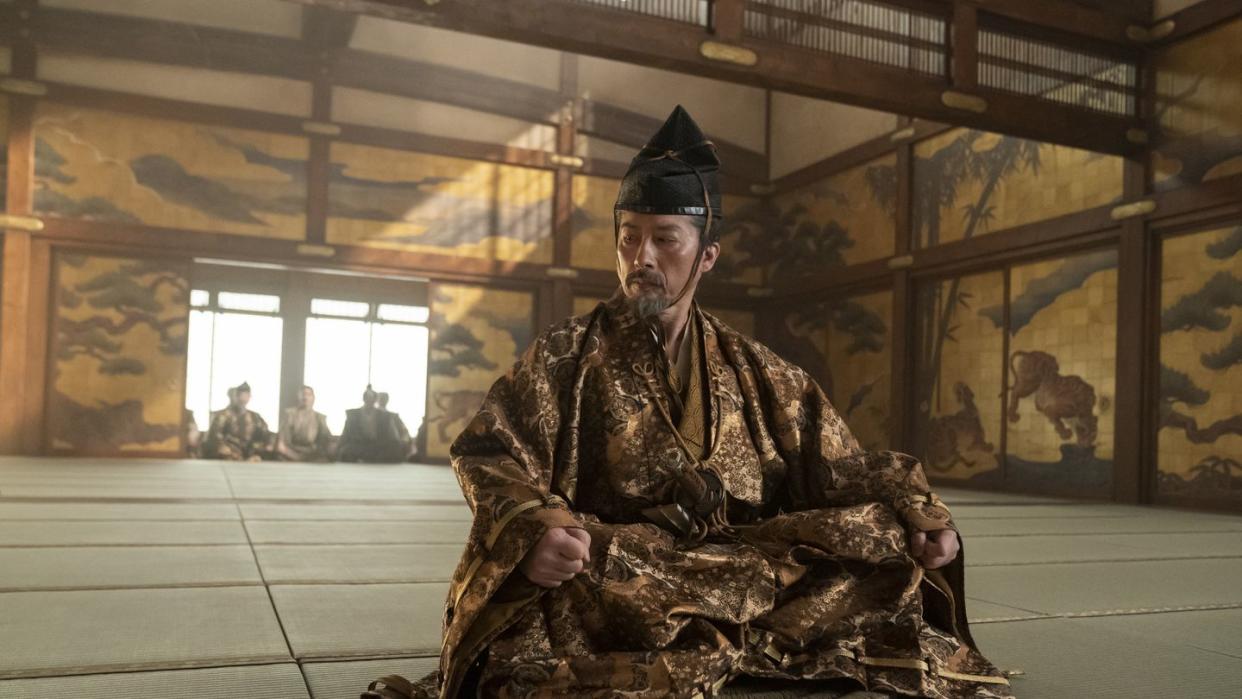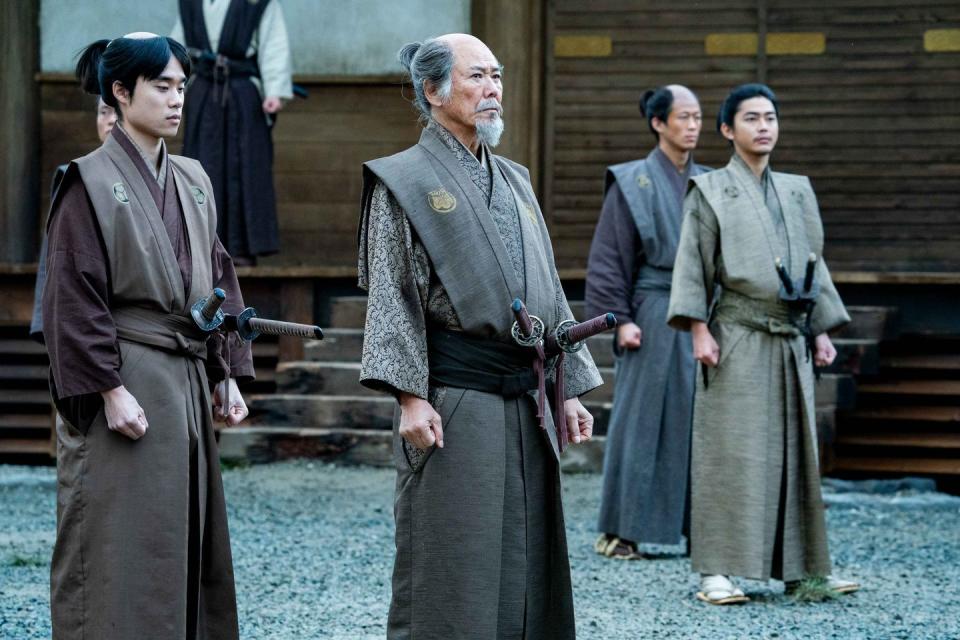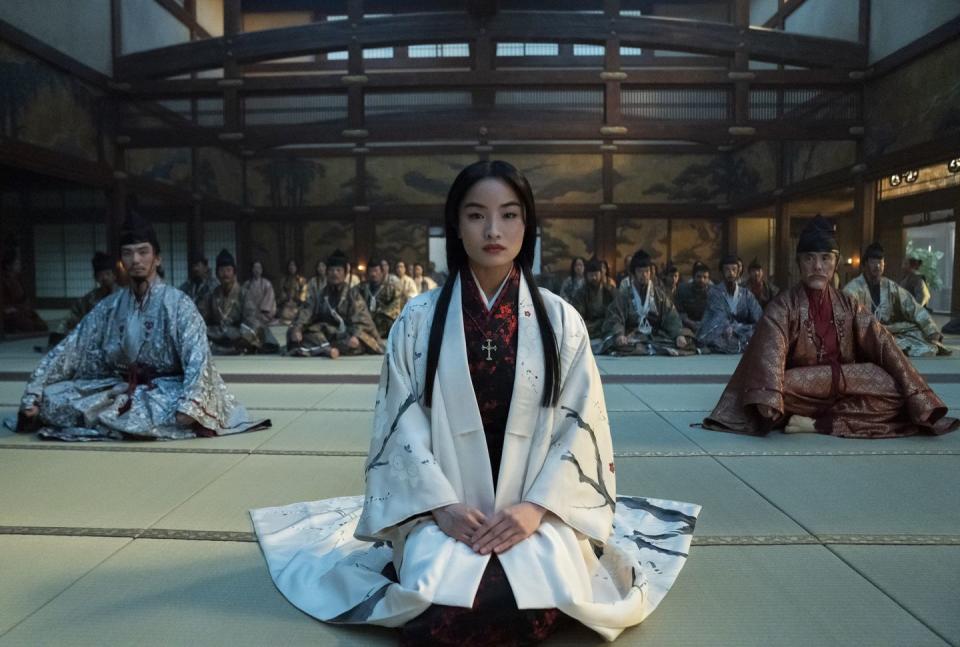Why 'Shōgun' Had to Be Told in Japanese

"Hearst Magazines and Yahoo may earn commission or revenue on some items through these links."
The majority of Shōgun, FX's newest period drama set in feudal Japan, is told in Japanese. That shouldn't be a revelation, or a surprise—it's a story about Japanese history—and yet, it feels like a big, important choice.
Telling the story in Japanese was key to the entire show. "It feels like if the show was made 10, 15 years ago, perhaps the decision would lean more on the English language," producer Eriko Miyagawa tells T&C. "I feel like in this day and age, audiences are more open to reading subtitles, and seeing actors who speak their native language deliver the performance. The time was calling for this level of authenticity."

Having the majority of the show's dialogue be in Japanese, co-creator Rachel Kondo tells T&C, "is an aspect of the show that we are most proud of." She adds, "we are so grateful to FX for entrusting us with the process of learning how to do that and for having the faith in it." For her husband Justin Marks, who serves as showrunner, in addition to being the co-creator, working in Japanese was the "creatively right choice" for Shōgun. "To deny these characters—to deny our story the sophistication that would require us to understand what these Japanese characters are saying, and thus to have it subtitled, would be to sort of cut us at the knees in terms of how interesting this story could be," he says.
The other option was to substitute English for Japanese (in the show, English is used in place of Portuguese). "There's a number of reasons why that doesn't work for us," Marks says. "One reason is that it limits your casting pool: It means that now suddenly you're looking for not the best actors possible, but the best actors from Japanese culture who can also speak English. Now you're very narrow in how you can select—and there's wonderful actors in that pool—but we have hundreds of roles to cast."
As he notes, "This is a show about translation. This is a show about the process by which we don't really fully understand what is being said and then learn, or watch someone translate, giving their angle for what they want. I don't know how you do that if you're substituting it all for English."

Once they decided to tell the story in Japanese, it wasn't an easy process. Marks and Kondo's writer's room—which was predominately filled with Asian American women, none of whom were native Japanese speakers—operated in English, and then they sent the scripts to a team of Japanese translators. When those scripts came back, producers Hiroyuki Sanada (who also stars as Lord Toranaga) and Miyagawa essentially told Marks and Kondo that the Japanese provided wasn't going to work for dialogue. With Sanada and Miyagawa's supervision, the scripts were then sent to a Japanese playwright Kyoko Moriwaki, so as to "capture the nuance of period piece dialogue with a hint of modernity." Marks recalls that Sanada continued to adjust the dialogue on set, working with the actors to get it right.
For the actors in the show, too, working in Japanese made a difference. Sanada tells T&C, "the language is a very important part of culture," informing body language, tone, and much more. Anna Sawai, who plays Mariko, concurs, saying, "There's a beauty in the language, even if you can't understand it—just listening to it, there's a melodic thing."
The actors also improvised while on set, which further complicated the subtitle process. "What we ended up doing is retranslated what was spoken back into English, so that we could close the gap between what is performed and what is experienced through for the viewer," Kondo says. Often in foreign films, the subtitles are the scripted words—not the precise words the actors actually say. "When performed things change ever so slightly," Marks says. "We wanted to make sure this game of telephone that was being played would be closely polished."

The Shōgun team wanted to use subtitles as a way to bring the audience closer to the performances, and in post-production, when the subtitle appeared was a constant discussion. "We would arbitrate: Her face turns on that moment, let's make sure that those are the words underneath her when that happens so that we can feel the same way she does when reacting," Marks says.
Ultimately, when watching Shōgun, it's clear why the show shouldn't be in English: As Marks said, it's a story about what gets lost in translation when two cultures collide.
Miyagawa says that she hopes the decision to work in Japanese means like the tides are turning in Hollywood towards authentic storytelling in period dramas. And that there's evidence English-speaking audiences are willing to watch foreign language films. As South Korean director Bong Joon-ho famously said (through his translator, Sharon Choi) at the Golden Globes when accepting a trophy for Parasite, "Once you overcome the one-inch tall barrier of subtitles, you will be introduced to so many more amazing films."
The first two episodes of Shōgun are now streaming on FX on Hulu. Watch now
You Might Also Like

